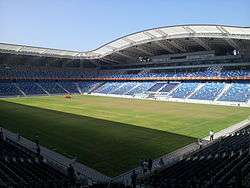Sammy Ofer Stadium
The Sammy Ofer Stadium (Hebrew: אצטדיון סמי עופר), also known as Haifa Municipal Stadium (האצטדיון העירוני חיפה), is a 30,780 seats multi-purpose stadium in Haifa, Israel.[2] Construction began in late 2009 and was completed in 2014. The stadium was developed and built by the Haifa Economic Corporation, managed by Adv. Gal Peleg.
Avi Ran Stadium, Haifa Stadium | |
 | |
| Full name | Haifa International Stadium |
|---|---|
| Location | Haifa, Israel |
| Owner | Haifa Municipalit |
| Operator | Haifa Municipalit |
| Capacity | 30,780[1] |
| Field size | 22,000 m2 (240,000 sq ft) |
| Surface | Grass |
| Construction | |
| Broke ground | 2009 |
| Opened | 27 August 2014 |
| Construction cost | ₪530 million |
| Architect | KSS Design Group |
| Tenants | |
| Maccabi Haifa (2014–present) Hapoel Haifa (2014–present) Israel national football team (2014–present) | |
Currently, the stadium is used mostly for football matches, hosting the home games of Maccabi Haifa and Hapoel Haifa F.C. The stadium replaced Kiryat Eliezer Stadium, which was closed in 2014 and demolished in 2015. The stadium is named after the late Israeli billionaire Sammy Ofer, who donated $20,000,000 to build the stadium. Ofer's contribution was 19% of the total cost of the stadium. The stadium also serves the Israel national football team for some select home matches.
History

On September 16, 2008, the Haifa Construction Committee approved the stadium's plans and gave it the green light.
In August 2009, official plans of the stadium released.
In September 2009, it has been announced that the works on building the foundations of the stadium would begin at the end of September 2009. The first official match ever at Sammy Ofer Stadium was played on August 27, 2014. Hapoel Haifa hosted Hapoel Acre (TOTO CUP) and won 2–0. The first historic goal in the new stadium was scored by Hapoel Haifa striker Tosaint Ricketts. The first league match was played on September 15, 2014. Maccabi Haifa hosted Bnei Sakhnin F.C., who they defeated by a score of 4–2. The historic first goal by a Maccabi Haifa player was scored by Israeli national team midfielder Hen Ezra during stoppage time of the first half. Over 31,000 supporters were in attendance.[3] The first UEFA Champions League match was played on September 30, 2015 by Maccabi Tel Aviv against Dinamo Kiev,[4] Dinamo won 2–0 by goles Andriy Yarmolenko and Júnior Moraes .
The first match of the Israel national football team was played on November 16, 2014. Israel hosted the Bosnia and Herzegovina national football team in the UEFA Euro 2016 qualifying match and won 3–0. The stadium was sold out, which resulted in an atmosphere beyond compare, helping Israel win their 3rd game in a row in the tournament.[5]
The first concert at the stadium was of Omer Adam on May 24, 2018.
International matches
| Date | Result | Competition | Attendance | ||
|---|---|---|---|---|---|
| 16 November 2014 | 3–0 | 2016 Euro qualifying group stage | 28,300 | ||
| 28 March 2015 | 0–3 | 2016 Euro qualifying group stage | 30,200 | ||
| 3 September 2015 | 4–0 | 2016 Euro qualifying group stage | 22,650 | ||
| 5 September 2016 | 1–3 | 2018 FIFA World Cup qualification | 29,300 | ||
| 11 June 2017 | 0–3 | 2018 FIFA World Cup qualification | 15,150 | ||
| 2 September 2017 | 0–1 | 2018 FIFA World Cup qualification | 11,350 | ||
| 11 October 2018 | 2–1 | 2018–19 UEFA Nations League C | 10,234 | ||
| 21 March 2019 | 1–1 | UEFA Euro 2020 qualifying | 12,430 | ||
| 24 March 2019 | 4–2 | UEFA Euro 2020 qualifying | 16,150 |
Gates
| Gate | Entrance | Area |
|---|---|---|
| Silver Club | A, B | 301–305, 307, 309-312 |
| Press Box | A, B | 306, 308 |
| Gold and Diamond Club | VIP | 401–410 |
| Sky Box | VIP | 501–536 |
| North Tribune | C, D | 101–109, 201-212 |
| Family Tribune | E, G | 110–113, 119–122, 213–217, 223-227 |
| East Tribune | F | 114–118, 218-222 |
| South Tribune | H, J | 123–128, 228-234 |
| Guest Tribune | K | 129–132, 235-240 |
See also
References
- Official stadium website
- www.kssgroup.com
- http://maccabi-haifafc.walla.co.il/?w=/3036/2785849 Archived 2014-12-25 at the Wayback Machine
- http://www.uefa.com/uefachampionsleague/season=2016/matches/round=2000634/match=2015685/postmatch/report/index.html
- https://int.soccerway.com/matches/2014/11/16/europe/european-championship-qualification/israel/bosnia-herzegovina/1653243/?ICID=PL_MS_24
External links
| Wikimedia Commons has media related to Sammy Ofer Stadium. |
- (in Hebrew) Official website
- (in Hebrew) Municipality of Haifa
- (in Hebrew) Haifa Economic Corporation Ltd.
- (in Hebrew) Official Plans
- (in Hebrew) KSS Group
- (in Hebrew) Sammy Ofer Stadium video